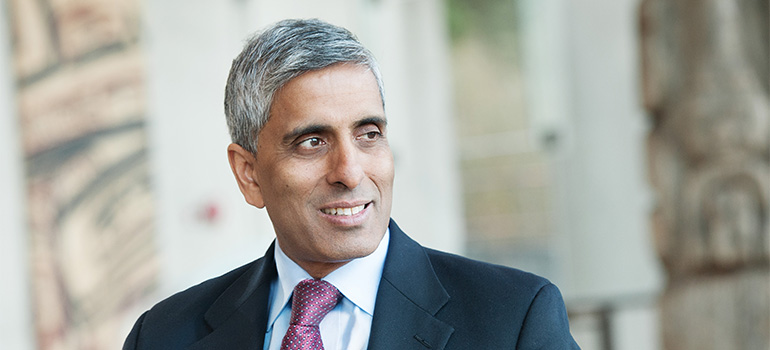Allen Eaves is not one to cause a public fuss.

The founder and CEO of STEMCELL, Canada’s largest biotech company, and the founding Director of the Terry Fox Laboratory for Hematology, Eaves has long been an influential figure at the intersection of private research and public universities that has fueled scientific innovation in Canada.
Like many high-level scientists affiliated with universities, he’s generally content to do research, give donations, and create opportunities for young graduates.
But now, in the wake of the continuing controversy at the University of British Columbia, Eaves is speaking out.
He wants people to know that something is not quite right in the sudden resignation of former President Arvind Gupta, just one year into his five-year term.
The University of British Columbia has said a non-disclosure agreement signed by them and Gupta, prior to his resignation, prevents them from discussing the terms of his abrupt departure that was agreed upon at the end of July and made public three weeks ago.
“He was just getting going. He was coming out with this long-term plan and ready to take some actions, and disappointed that he can’t,” says Eaves, who was chair of Mitacs, the research organization Gupta led prior to becoming President, from 2001 to 2011.
While Gupta’s resignation was shocking, it created only a minor stir outside the university community.
READ MORE: UBC president’s departure leaves questions
However, the crisis deepened after Jennifer Berdahl, a professor of Gender and Diversity at UBC’s Sauder School of Business, claimed that university authorities, including Chair of the Board of Governors John Montalbano, tried to intimidate and silence her for publicly suggesting Gupta may have lost a “masculinity contest.”
That led to an attempted secret meeting of the Board of Governors discovered by media, Montalbano attempting to leave the meeting privately, a pushback by Montalbano he had done nothing wrong, an escalation of the dispute between the Faculty Association and the Board of Governors, and finally, the announcement this week that Montalbano would temporarily step aside as Chair so the entire ordeal could be investigated.
WATCH: Montalbano’s full interview with Global News prior to his decision to temporarily step aside
The cumulative effect is that UBC, unaccustomed to public scrutiny – despite its two billion-dollar budget and $575 million annual grant from the provincial government – is caught in an ongoing crisis that threatens its reputation.
“My concern is a great university attracts great students and great post-doctoral fellows, and they go out and create great jobs,” says Eaves.
“Many of us are graduates of several universities, and have multiple loyalties. It could have an affect. I’m concerned about the multicultural community that’s been very supportive of UBC and how they react to this.”
To that end, Eaves is urging Montalbano to permanently resign from the board.
“It would certainly clear the path in an effective way if the present chair did resign,” says Eaves.
And he suggested an online petition be launched to ask B.C. Premier Christy Clark to investigate the resignation.
“I think the premier has been in a difficult situation…she doesn’t have all the information she needs to make a decision, and over time that will be resolved. I have every confidence that Christy Clark will make the right decision,” says Eaves.
WATCH: How well did UBC managed the controversy surrounding President Arvind Gupta? Edelman’s Bridgitte Anderson talks about how UBC could have handled the situation differently.
Two things will happen in the next six weeks that may give some resolution to the situation. Martha Piper, who was UBC’s President from 1997 to 2006, will take office for nine months beginning September 1, and is expected to bring some stability
In addition, by October 7 former B.C. Supreme Court Justice Lynn Smith will submit a report to UBC and the UBC Faculty Association about the conduct of Montalbano and people within the Sauder School of Business who allegedly infringed on Berdahl’s academic freedom.
READ MORE: The investigation’s terms of reference
But at this point, it seems unlikely the provincial government will get involved. Minister of Advanced Education Andrew Wilkinson says that they want the investigation by Smith to be completed.
“He basically says it’s up to the UBC board to figure this out,” says Legislative Bureau Chief Keith Baldrey, who says the confidentiality agreements put in place prior to Gupta’s resignation make a further investigation “a non-starter from the government’s point of view.”
“They’re hoping the UBC board can deal with this.”
In the meantime, there is a power vacuum at UBC without recent precedent at a major Canadian university. There is an Acting President, an interim Provost, an Acting Chair of the Board of Governors, no Vice-President for Communications, and a Vice-President for Finance who has been on the job for less than 100 days.
“UBC is a huge organization, and I’m sure it can function during this crisis. But leadership, good leadership is critical to keep the whole thing going,” says Eaves.
“I know Martha Piper is a very good person and is prepared to do this for nearly a year, until a resolution is made, but there’s all sorts of things not done because the real important people to carry on and be responsible are not there.”
And regardless what happens, there remains one question: What happened to Arvind Gupta?
With no concrete information, and the government reluctant to step in, the speculation among faculty, donors, staff and students will continue.
“Something had clearly gone wrong, and we don’t know what that is,” says Eaves.
“As a taxpayer, I want to know what’s going on, why has this happened? I’m sure our wonderful government under Christy Clark would want to know too.”
– With files from Rumina Daya




Comments